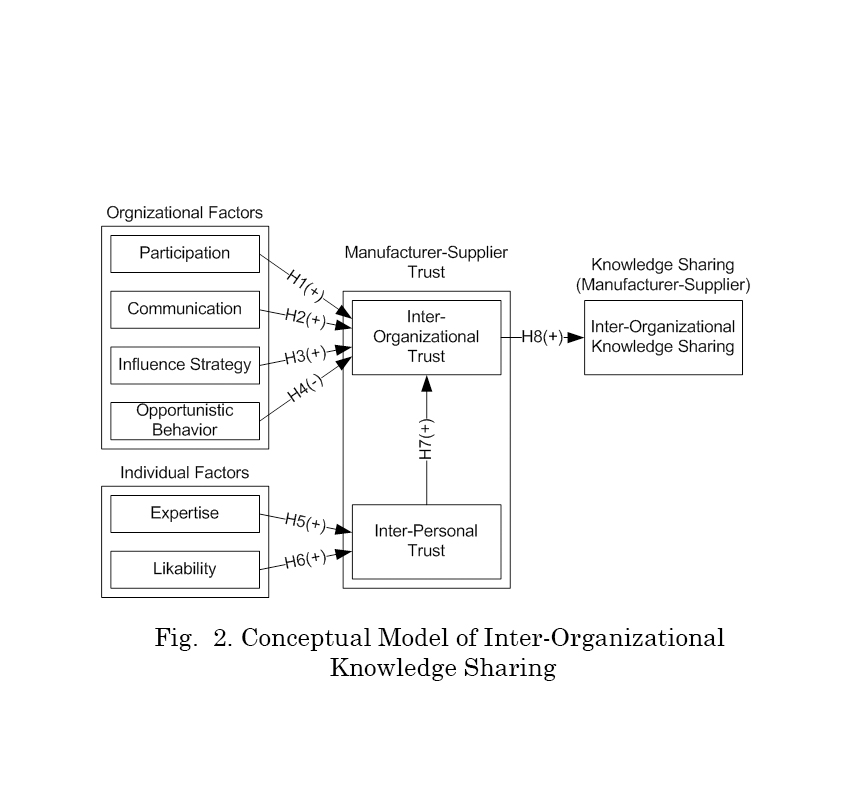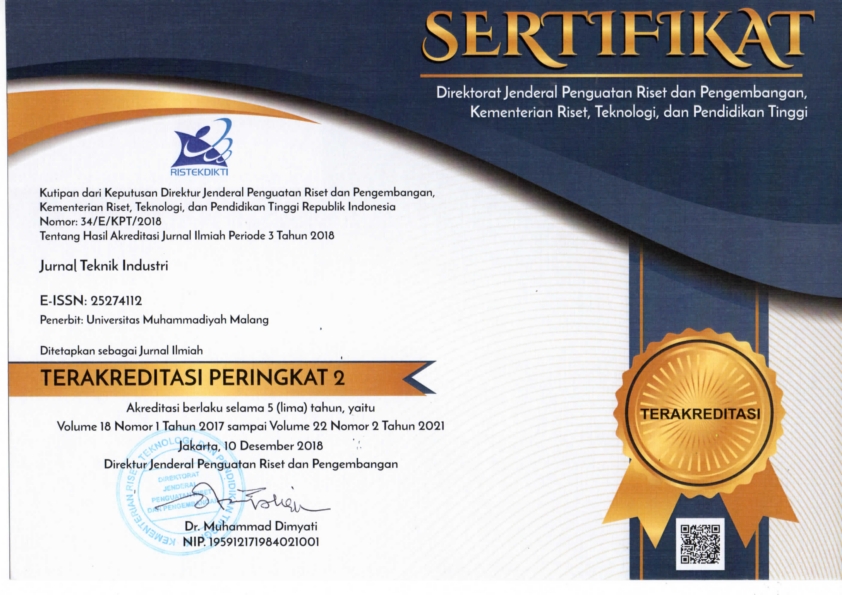Multi-Agent Simulation in the Inter-Organizational Trust Model and Knowledge Sharing in the Automotive Industry
DOI:
https://doi.org/10.22219/JTIUMM.Vol20.No2.161-171Keywords:
Inter-organizational, knowledge sharing, multi-agent, simulation, trustAbstract
Two organizations can share knowledge to determine the success of their collaboration. Effectiveness in knowledge sharing affects organizational performance and trust between organizations. This study aims to identify the implementation of multi-agent simulations to increase trust in sharing knowledge between organizations. A multi-agent simulation approach was used in this study. The research model was adopted from previous research. Several hypotheses and path coefficients were tested in simulation models. This study showed that multi-agent simulation is suitable as a problem-solving method for complex issues such as knowledge sharing. In addition, this study identified individual factors such as likability and expertise in the success of knowledge sharing between organizations.
Downloads
References
[1] H. H. Azwir and E. B. Pasaribu, "Pemilihan Supplier Menggunakan Metode Analytic Network Process Di PT UTPE," Jurnal Teknik Industri, vol. 18, pp. 103-112, 2017. https://doi.org/10.22219/JTIUMM.Vol18.No2.103-112.
[2] W. Khoiro, "“Evaluasi Supplier Bahan Baku Plat Besi Dengan Menggunakan Metode Analytical Hierarchy Process dan Taguchi Loss Function”(Studi Kasus pada PT. Lamongan Marine Industry)," University of Muhammadiyah Malang, 2015.
[3] M. Le Pennec and E. Raufflet, "Value creation in inter-organizational collaboration: An empirical study," Journal of Business Ethics, vol. 148, pp. 817-834, 2018. https://doi.org/10.1007/s10551-015-3012-7.
[4] M. Cao and Q. Zhang, "Supply chain collaboration: Impact on collaborative advantage and firm performance," Journal of operations management, vol. 29, pp. 163-180, 2011. https://doi.org/10.1016/j.jom.2010.12.008.
[5] B. Lawson, K. J. Petersen, P. D. Cousins, and R. B. Handfield, "Knowledge sharing in interorganizational product development teams: The effect of formal and informal socialization mechanisms," Journal of Product Innovation Management, vol. 26, pp. 156-172, 2009. https://doi.org/10.1111/j.1540-5885.2009.00343.x.
[6] J.-H. Cheng and Y.-C. Fu, "Inter-organizational relationships and knowledge sharing through the relationship and institutional orientations in supply chains," International Journal of Information Management, vol. 33, pp. 473-484, 2013. https://doi.org/10.1016/j.ijinfomgt.2013.01.002.
[7] Y.-H. Chen, T.-P. Lin, and D. C. Yen, "How to facilitate inter-organizational knowledge sharing: The impact of trust," Information & Management, vol. 51, pp. 568-578, 2014. https://doi.org/10.1016/j.im.2014.03.007.
[8] M. Ibrahim, "Interorganizational Trust and Interorganizational System's Information Quality," in ICIQ, 2005.
[9] F. Ramadhan and T. Samadhi, "Inter-organizational trust and knowledge sharing model between manufacturer and supplier in the automotive industry," in 2016 IEEE International Conference on Industrial Engineering and Engineering Management (IEEM), 2016, pp. 856-860. https://doi.org/10.1109/IEEM.2016.7797998.
[10] F. Ramadhan, A. F. Rizana, R. Rispianda, and Y. Yuniati, "Kesuksesan Knowledge Transfer Di Laboratorium Perguruan Tinggi Melalui Pengelompokan Rekan Kerja Menggunakan Agent-Based Modeling And Simulation," Jurnal Teknik Industri, vol. 19, pp. 205-219, 2018. https://doi.org/10.22219/JTIUMM.Vol19.No2.205-219.
[11] F. Ramadhan, R. Soesanto, A. Rizana, A. Kurniawati, and I. Wiratmadja, "Mechanisms for effective tacit knowledge transfer in university laboratory: An agent-based approach," in 2017 IEEE International Conference on Industrial Engineering and Engineering Management (IEEM), 2017, pp. 1138-1142. https://doi.org/10.1109/IEEM.2017.8290070.
[12] F. Ramadhan, A. Rizana, R. P. Soesanto, A. Kurniawati, and I. I. Wiratmadja, "An Application of Agent-based Modeling and Simulation in Tacit Knowledge Transfer Effectiveness and Individual Performance through the Consideration of Feedback Mechanism," in 2018 IEEE International Conference on Industrial Engineering and Engineering Management (IEEM), 2018, pp. 346-350. https://doi.org/10.1109/IEEM.2018.8607549.
[13] J.-H. Cheng, C.-H. Yeh, and C.-W. Tu, "Trust and knowledge sharing in green supply chains," Supply Chain Management: An International Journal, vol. 13, pp. 283-295, 2008. https://doi.org/10.1108/13598540810882170.
[14] A. Brinkhoff, Ö. Özer, and G. Sargut, "All you need is trust? An examination of inter‐organizational supply chain projects," Production and operations management, vol. 24, pp. 181-200, 2015. https://doi.org/10.1111/poms.12234.
[15] T. Das, "Strategic alliance temporalities and partner opportunism," British Journal of Management, vol. 17, pp. 1-21, 2006. https://doi.org/10.1111/j.1467-8551.2006.00482.x.
[16] K. H. Wathne and J. B. Heide, "Opportunism in interfirm relationships: Forms, outcomes, and solutions," Journal of marketing, vol. 64, pp. 36-51, 2000. https://doi.org/10.1509/jmkg.64.4.36.18070.
[17] B. Ashnai, S. C. Henneberg, P. Naudé, and A. Francescucci, "Inter-personal and inter-organizational trust in business relationships: An attitude–behavior–outcome model," Industrial Marketing Management, vol. 52, pp. 128-139, 2016. https://doi.org/10.1016/j.indmarman.2015.05.020.
[18] W. Rutten, J. Blaas-Franken, and H. Martin, "The impact of (low) trust on knowledge sharing," Journal of knowledge management, vol. 20, pp. 199-214, 2016. https://doi.org/10.1108/JKM-10-2015-0391.
[19] S. Knox, P. Meier, J. Yoon, and J. J. Harou, "A python framework for multi-agent simulation of networked resource systems," Environmental Modelling & Software, vol. 103, pp. 16-28, 2018. https://doi.org/10.1016/j.envsoft.2018.01.019.
[20] A. Bhaskar, M. Cools, and E. Chung, "An investigation of timed transfer coordination using event-based multi agent simulation," Transportation Research Part C: Emerging Technologies, vol. 81, pp. 363-378, 2017. https://doi.org/10.1016/j.trc.2017.02.018.
[21] X. Meng, Z. Wen, and Y. Qian, "Multi-agent based simulation for household solid waste recycling behavior," Resources, Conservation and Recycling, vol. 128, pp. 535-545, 2018. https://doi.org/10.1016/j.resconrec.2016.09.033.
[22] H. Takahashi, N. Nishino, and T. Takenaka, "Multi-agent simulation for the manufacturer's decision making in sharing markets," Procedia CIRP, vol. 67, pp. 546-551, 2018. https://doi.org/10.1016/j.procir.2017.12.258.
[23] S. Kim and H. Lee, "The impact of organizational context and information technology on employee knowledge‐sharing capabilities," Public administration review, vol. 66, pp. 370-385, 2006. https://doi.org/10.1111/j.1540-6210.2006.00595.x.
[24] X. Zhang and J. Y. Jiang, "With whom shall I share my knowledge? A recipient perspective of knowledge sharing," Journal of Knowledge Management, vol. 19, pp. 277-295, 2015. https://doi.org/10.1108/JKM-05-2014-0184.
[25] J.-C. Lee, Y.-C. Shiue, and C.-Y. Chen, "Examining the impacts of organizational culture and top management support of knowledge sharing on the success of software process improvement," Computers in Human Behavior, vol. 54, pp. 462-474, 2016. https://doi.org/10.1016/j.chb.2015.08.030.
[26] W.-J. Chang, S.-H. Liao, and T.-T. Wu, "Relationships among organizational culture, knowledge sharing, and innovation capability: a case of the automobile industry in Taiwan," Knowledge Management Research & Practice, vol. 15, pp. 471-490, 2017. https://doi.org/10.1057/s41275-016-0042-6.
[27] T. Pei-Lee, C. Y. Chen, W. C. Chin, and Y. Y. Siew, "Do the Big Five Personality Factors affect knowledge sharing behaviour? A study of Malaysian universities," Malaysian Journal of Library & Information Science, vol. 16, pp. 47-62, 2017.
[28] A. Kurniawati, T. Samadhi, I. I. Wiratmadja, and R. P. Soesanto, "The Impact of Source, Recipient, and Tacit Knowledge Characteristics on Tacit Knowledge Transfer Effectiveness," in Proceedings of the Asia Pasific Industrial Engineering & Management System 2016, 2016.
[29] L. N. Marouf and O. E. Khalil, "The influence of individual characteristics on knowledge sharing practices, enablers, and barriers in a project management context," International Journal of Knowledge Management (IJKM), vol. 11, pp. 1-27, 2015. https://doi.org/10.4018/IJKM.2015010101.

Downloads
Published
How to Cite
Issue
Section
License
Copyright (c) 2019 Afrin Fauzya Rizana, Fadillah Ramadhan

This work is licensed under a Creative Commons Attribution-ShareAlike 4.0 International License.











